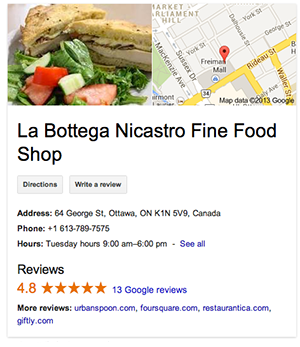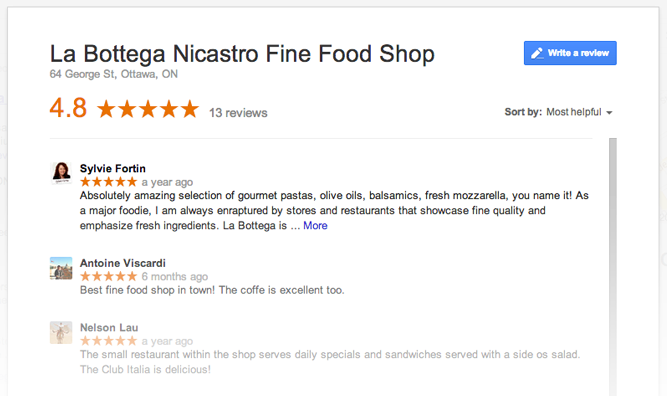Customer reviews and testimonials have always been an effective way to demonstrate third party proof that your business is trustworthy and does what it says it does.
And with local search services like Google Places now prominently displaying reviews, they've become more important than ever.
However, getting authentic reviews and testimonials on a consistent basis will require a proactive approach that encourages customers to engage with your profile.
The good news is, when used to your advantage, reviews provide multi-channel retailers with invaluable feedback about their products and services and are an excellent marketing tool that can motivate new customers to visit your website or physical retail location.
Let's take a look at how you can start getting better Google Places reviews for your business.
Google Places for Business
 Google Places for Business is a local marketing service that helps to connect shoppers with local businesses that sell the products those shoppers want at the time that they want them.
Google Places for Business is a local marketing service that helps to connect shoppers with local businesses that sell the products those shoppers want at the time that they want them.
The service allows any business with a physical location to display store information, a map, photos, videos, coupons and more.
Your Google Places profile will also include a set of customer-submitted reviews. These reviews should reflect a given shoppers honest opinion about a retailer’s service; product selection and quality; and general trustworthiness.
They're also a great opportunity to demonstrate positive social proof for your business.
In other words, a shopper unfamiliar with a local retail shop can use these reviews to distinguish between similar stores or even to decide whether or not to visit a store at all.
4 Ways to Encourage Google Places Reviews

Given the potential value that positive Google Places reviews can have for a multi-channel retailer, savvy retail marketers should try to encourage shoppers to publish Google Places reviews.
Here are four simple ways to do just that.
1. Ask for a review after each transaction
After a customer has made a purchase from either your physical store or your online shop, ask that customer to take a moment to provide you with feedback about the products purchased and service provided.
In a physical store, this might include handing the shopper a small reminder card with a Google Places review box URL on it or including the review URL on the bottom of a printed receipt.
For an online store, consider including the review request at the bottom of a shipping notification email or in a separate email sent a week or so later, giving the online shopper time to have received the order.
2. Link Directly to the Review Form
A smart strategy for driving more reviews is to point visitors directly to the Google Places review form rather than providing a URL that sends them to your general Google Place page.
If a business has integrated Google Places with Google+ (this is an important step toward optimizing a Places profile for search) the target review URL will be like this:
https://plus.google.com/GOOGLE_IDENTIFIER_GOES_HERE/about?gl=US&hl=en-US&review=1
You can use is link on websites, in advertising and marketing promotions, and any time a customer is asked to leave a review.
3. Show Off Positive Reviews
In general, people like to be part of a group and they like recognition from that group. In fact studies have shown that this desire for group acknowledgement is the underlying psychological reason why folks leave positive reviews.
You can take advantage of this by showing off your positive Google Places reviews by including them on your website, at checkout in the physical store and in select promotions.
For example, a merchant might produce a video showing a dozen or so positive reviews set to music. All of this attention may encourage new customers to join the ranks of shoppers praising a particular store.
4. Reward Reviews After They’ve Been Given
Google Places reviews are a form of word-of-mouth marketing. One customer is effectively telling many potential customers that a store is trustworthy.
Retailers might encourage additional word-of-mouth and additional Google Places reviews by rewarding reviewers after the fact.
As an example, imagine a shopper who regularly visits a store and writes a positive review on your Google Places page. The next time that shopper visits, you might give him or her a free t-shirt, a special discount, or some other gift.
If an online shopper leaves a positive review, the merchant could email the reviewer offering free shipping on future orders or free merchandise. In each case the rewarded reviewer is likely to tell friends, who in turn might write their own reviews.
A Cautionary Tale of Review Requesting
As a general rule, a retailer should not offer shoppers a gift or even a chance to win a gift for writing a review. Rather, if any kind of reward is to be given it should be unexpected and done after the fact, as point number four above suggests.
Offering a reward for a review afterwards is very different that promising a gift before a shopper reviews a store.
The former is doing something nice for a customer that has taken action of their own accord, while the latter — offering a reward in advance — may be seen as a bribe for writing what some critics have called fake reviews.
Consider the case of Amazon Marketplace seller, VIP Deals, which garnered a significant amount of negative attention and even lost the opportunity to sell in the Amazon Marketplace, after the New York Times reported in January 2012 that the company had been refunding customers who wrote positive reviews.
Although VIP Deals went a bit further than most companies, the case has generally soured the practice of offering anything in exchange for a review and rendering any review given under such circumstances “fake.”
Dealing With Negative Reviews
The final consideration for encouraging positive Google Places reviews is to have a plan for managing any negative reviews that come in.
When you connect your Google Places for Business account with your Google+ account, you gain the ability to respond publicly to reviews. So when a negative review does come in, you have an opportunity to tactfully correct any inaccuracies and offer a solution to the problem.
Remember, customers need to believe that if something goes wrong with the purchase process that your business is paying attention and that you will make an effort to make things right.
If you get a negative review that you think is legitimate, take a moment to ask yourself if maybe there is something you could be doing better or a system you could improve in your business.
Have you subscribed for free email updates yet? Get ecommerce, online marketing and social media resources delivered directly to your inbox by signing up in the sidebar on the right.
Read more
- The 8 Best Podcasts for On-the-Go Retail Entrepreneurs
- Cause Marketing: What It Is, How To Do It, and Why It Matters
- How to Get Started with Google Places for Business
- Hyper-Personalization: 4 Examples of Retailers Doing it Right
- How to Build a Brand Story for Your Retail Store in 2024
- How to Set Up Google Maps Ads for Beginners
- 24 Retail Blogs Every Small Business Entrepreneur Should Be Reading
- Summer Marketing: 20 Ideas To Survive The Summer Slump In Revenue
- Retail Partnerships: How to Collaborate with Other Stores (+ 9 Examples)





